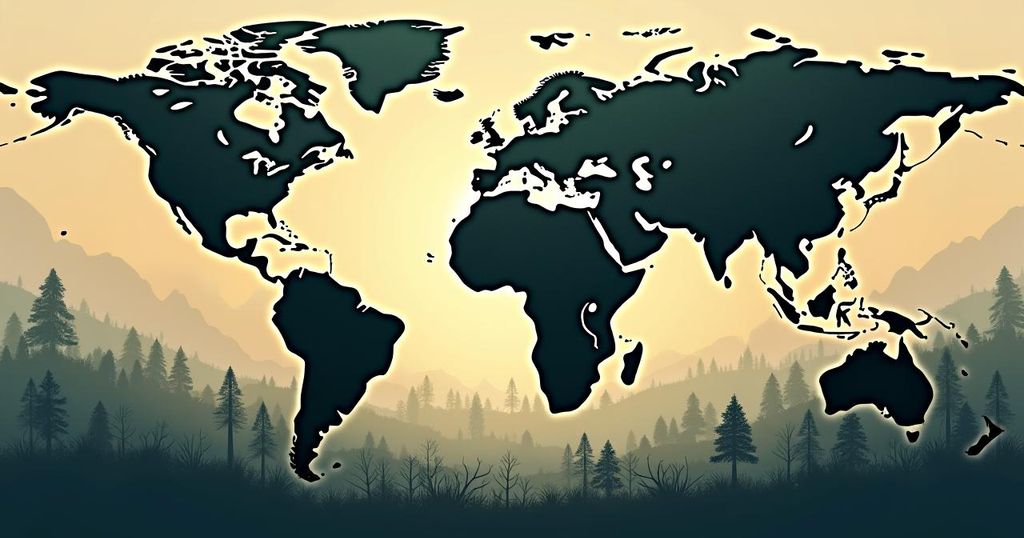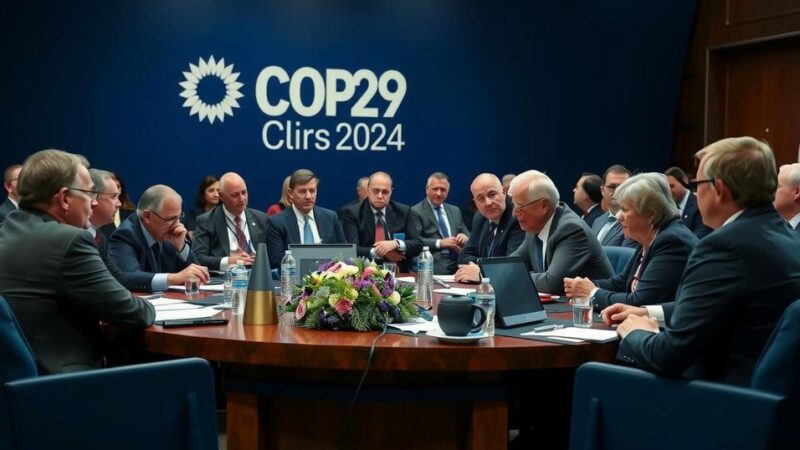A recent study revealed that deforestation rates in 2023 significantly outpaced global efforts to halt the practice by 2030, with 6.37 million hectares of forest lost. Bolivia and Indonesia reported alarming increases, while Brazil showed some progress in the Amazon. The report calls for stronger policies to safeguard forests amid rising global demand for eco-friendly materials, indicating urgent action is needed to combat this crisis.
Recent studies have indicated that deforestation is occurring at an alarming rate, outpacing global efforts to halt such practices by 2030. A collaborative report, shared by numerous research institutions, non-governmental organizations (NGOs), and advocacy groups, has revealed that approximately 6.37 million hectares (around 15.7 million acres) of forest were lost in 2023 alone, a loss comparable to the size of Ireland. This figure significantly exceeds sustainable levels needed to meet the commitment made by over 140 world leaders in 2021 to eliminate deforestation by the end of the decade. Forests play an essential role in supporting approximately 80 percent of terrestrial biodiversity and are pivotal in regulating atmospheric carbon dioxide levels, a major contributor to climate change. Ivan Palmegiani, a biodiversity and land-use expert and lead author of the “Forest Declaration Assessment” report, cautioned that, “Globally, deforestation has gotten worse, not better, since the beginning of the decade.” The report pointed out that in 2023, the world saw the loss of 3.7 million hectares of tropical primary forests, which are vital for carbon storage and biodiversity. Particular areas of concern are Bolivia and Indonesia, where deforestation rates have surged. In Bolivia, there has been a staggering increase of 351 percent in deforestation from 2015 to 2023, primarily for agricultural purposes, including soy, beef, and sugarcane. Conversely, while Indonesia saw a temporary reduction in deforestation rates from 2020 to 2022, there has been a resurgence in 2023, partially attributed to the rising demand for materials perceived as environmentally friendly, such as viscose used in clothing, and the booming nickel mining industry providing resources for electric vehicle batteries. In Brazil, although it still leads the world in deforestation rates, there is encouraging progress due to protective measures implemented by President Luiz Inacio Lula da Silva in the Amazon region. Sadly, deforestation has increased in the Cerrado, a crucial tropical savannah region adjacent to the Amazon. The report also highlighted the issue of forest degradation caused by logging, road construction, and wildfire incidents. In the year 2022, an area equivalent to twice the size of Germany was reported as degraded rather than completely cleared. Erin Matson, a senior consultant at Climate Focus and co-author of the report, emphasized the necessity of “strong policies and strong enforcement,” claiming that forest protection requires stability beyond political and economic fluctuations. The report arrives at a critical juncture, with the European Commission recently proposing to delay the implementation of its anti-deforestation law to the end of 2025, which has drawn criticism from many NGOs. Matson remarked on the urgency of rethinking consumption and production models to mitigate reliance on the over-exploitation of natural resources.
The ongoing issue of deforestation is a global concern, significantly impacting biodiversity, carbon storage, and climate regulation. Various international commitments have been formulated to curb deforestation, but recent trends indicate a troubling increase in deforestation rates, particularly in regions such as Bolivia and Indonesia, which have often faced backsliding in their environmental protections. Understanding the socio-economic factors driving these changes, as well as the specific ecological ramifications, is crucial for developing effective policy responses and restoring ecosystems.
The alarming rise in deforestation rates, as reported, underscores the urgency of global climate action, highlighting a disconnect between pledges made by world leaders and the actual trends observed in forest conservation. As countries grapple with the need for sustainable development versus economic demands, it is imperative to implement robust policies and actions focused on forest protection to mitigate climate change and preserve biodiversity.
Original Source: phys.org






